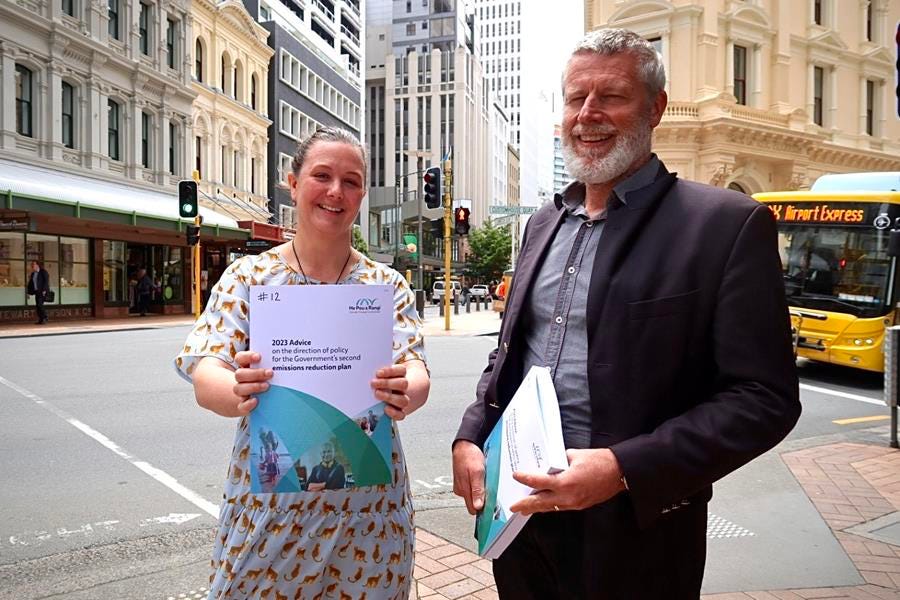
TL;DR The hygiene effects of direct sunshine are making some inroads, perhaps for the very first time, on the normalised ‘deficit of ecological integrity’ at the UN’s annual climate summit.
Elsewhere in climate news this week:
Climate communications expert Ketan Joshi provided an excoriating break-down and analysis of the truth-revealing exchange between ex-Irish President Mary Robinson and COP28 President Ahmed Al Jaber
Record breaking emissions are reported by the WMO and the The Global Carbon Project, highlighting the massive emissions gap revealed by the first five-yearly Paris Agreement Stock-take.
The Climate Trace Initiative, co-founded by none other than Al ‘Inconvenient Truth’ Gore, used the COP28 event to dump a tonne of data from its satellite tracking and AI software, potentially pinpointing just where the lies are being told.
The immediate risk of being ‘outed’ prompts a round of new commitments to methane reduction. In particular, the US makes immediate moves to try and protect its narrative of natural gas as a ‘bridging fuel’.
The ‘climate action = living in caves’ trope suffers a setback as researchers point out that eliminating extreme poverty in the world would have only a marginal impact on GHG emissions.
A note from Bernard: We’re proud at The Kākā that our climate correspondent can produce a weekly wrap of the key climate news and developments for all subscribers to The Kākā, both paying and non-paying. Becoming a full subscriber helps us produce this sort of detail and analysis for all to read in front of the paywall. We’re committed to ensuring all of Cathrine’s work here is available to all. Here’s our special introductory offer for a year that’s available until the end of Gravy Day on December 21, our last day of publication for 2023.
We also have a great offer for under 30s.
Bring me sunshine…
All in all, it’s been a hell of a week for lovers of the golden rays and their ability to cut-through the seemingly never-ending stream of you-know-what at COP 28 in Dubai.
You have no doubt heard about the revealing moment that occurred at one of the COP 28 events last week, during a conversation between ex-Ireland President and former UN Special Envoy for Climate Change Mary Robinson and current COP President Ahmed Al Jaber.
Robinson asked Al Jaber a series of very simple, direct and highly pertinent questions and he responded with a high-octane public meltdown, sprinkled with misogyny and fueled by too much of his own carbon Kool-aid. Ignition was but a single mundane query away. These were the questions everybody else had been asking about this COP, but nobody had thought to put them to the man at the centre of it all.
Ketan Joshi’s analysis of each part of the exchange is here. Stretch your facial muscles in advance to avoid an injury from all the wincing.
Al Jaber: “We can always play with words here. You are a good politician, and you know how to use words better than I do. I’m a businessman, I am centered around delivery and actions”
Robinson and Al Jaber were debating using “fast track” or “urgent” to describe action to stop burning fossil fuels. Al Jaber insinuates that businessmen are rational and focused on outcomes and performance, suggesting that Robinson is trained at deception. It’s a weird one, because Robinson has a point: “fast track” is a phrase I see get used to describe a delivery option for my light bulbs, not for dealing with an immediate and gut-wrenching physical threat to my existence.
The tone, though, is set pretty clearly: a bitter, acidic overreaction to a factual statement, but framed explicitly as if a reproachful insult is clear-headed and rational.
‘I am the man in charge’
The bit where Al Jaber drops “I am the man in charge” into the middle of a session about women in climate action is priceless.
Despite Al Jaber’s failure to utter a single truthful statement it somehow managed to be the most honest public display of ‘truthiness’ we never expected to see at a global climate talk-fest.
This was the best thing to come out of COP28. The hygiene from direct sunlight is the one thing most likely to lead to organisations and countries actually meeting some of the pledges they make at COP 28.
Greenhouse gases at record highs
The World Meteorological Society (WMO) announced last month that CO2 concentrations in the atmosphere were a full 50% above the pre-industrial era for the first time, that they are continuing to grow in 2023 and that there is no sign of them stopping. The other two main greenhouse gases (GHGs), methane and nitrous oxide, saw record growth between 2021 and 2022. The Global Carbon Project has also just reported that fossil CO2 emissions reached a record high in 2023
The first global stocktake of the Paris Agreement targets found that current national commitments fall short by 20.3 to 23.9 gigatonnes of CO2 equivalent compared to the levels required to limit warming to 1.5˚C by 2030. That target represents a 43% cut in emissions compared to 2019. It’s not just that global emissions haven’t declined sufficiently. So far, they haven’t declined at all. Rather than almost halving emissions in the six years before 2030, the most we can hope for now is a halt in their relentless upward trajectory.
You’ll never believe what happened next
As if that wasn’t bad enough, satellite tracking data is now showing that many countries and organisations are not providing accurate figures, with some countries failing to provide updates at all for the global stocktake. The Climate Trace initiative, co-founded by Al Gore, have used the COP28 setting to release data showing exactly where the biggest GHG emissions increases have come from.
According to this Guardian report, based on the data release, the largest emissions increases have come from electricity generation in China and India, and oil and gas production in the US.
“Climate Trace uses satellite images and AI software to pinpoint the sources of emissions with a high degree of accuracy around the world, and has uncovered discrepancies between countries’ and companies’ reporting of emissions and their actual behaviour.”
If you wondered why there was a sudden rush to commit to reductions in methane emissions from fossil fuels at COP28, it might have something to do with what this satellite data is capable of showing. Studies in the US over the past few years have suggested that methane leaks from natural gas pipelines are underestimated by the EPA by as much as 60%, putting at risk the claim that it could be used as a ‘bridging fuel’ in the shift away from coal. That would be a major challenge to a key American fossil narrative. The Climate Trace organisation is bringing online new satellite technologies that can pinpoint exactly where and how much leakage is occurring. It is also pinpointing the proliferation of routine methane flaring occurring globally at oil and gas production plants, despite previous voluntary agreements to reduce it. In other words, the satellite data has the power to cut right through the bullshit narratives that pepper COP conversations.
When the data shines a light on the self-reporters
While many environmental NGOs are pointing out that voluntary pledges are insufficient and have failed to deliver results in the past, it is reasonable to suggest that this time might be different. This time, accountability will not rest solely on self-reported data from the leakers themselves. This time, sunlight from satellite data will be in the hands of the masses. Everybody and anybody can view the data, which is presented in a beautifully user-friendly format right here, and use it to hold feet to flames.
You might see all of this information as an overwhelming amount of bad news. But there is a bright side to this deluge of reality. COP28 is going to go down as the year of the truth bomb and the site of an epic clash between trackers and laggards.
The trope of ‘living in caves’ emerges blinking into the sunlight
Here’s another welcome bit of sunlight. Let’s circle back to Al Jaber’s revelatory rant in which he said “Please help me show me the roadmap for a phase of the fossil fuel that will allow that will allow for sustainable socioeconomic development. Unless you want to take the world back into caves?” As Ketan Joshi points out “Climate action = ‘living in caves’ is another long-running trope of deniers and fossil advocates”.
In fact, this newly released study has found that eliminating extreme poverty in the world would have only a marginal effect on global GHGs, raising emissions by less than 5% by 2050 and that this number can be reduced by a factor of 10 if climate-smart approaches to growth, which aim to reduce inequality and use improved technologies, are introduced. This reinforces the claim that efforts to reduce poverty are not in conflict with the urgency of addressing climate change. Rather, a failure to address poverty, both within and between countries, is a structural impediment to climate action.
If we are going to base the future liveability of the planet on a voluntary agreement organised by a notoriously toothless global institution, that puts a fossil baron in charge of progress, there is really only one thing that can get between us and catastrophe. There’s a very good reason why interrogations always take place under the harsh glare of a well-directed spotlight.
In other news this week,
Scientists are warning that the world is on the verge of at least five catastrophic tipping points that can create feedback loops which then set off a domino effect. According to The Guardian’s coverage of the new Global Tipping Points Report, which was produced by an international team of 200 researchers:
“The researchers said the systems were so tightly linked they could not rule out “tipping cascades”. If the Greenland ice sheet disintegrates, for instance, it could lead to an abrupt shift in the Atlantic Meridional Overturning Circulation, an important current that delivers most of the heat to the gulf stream. That, in turn, can intensify the El Niño southern oscillation, one of the most powerful weather patterns on the planet.”
In addition to the 5 thresholds already at risk, three more could be reached in the 2030s if the world heats 1.5˚C above pre-industrial temperatures.
Climate Action Tracker this week updated its warming projections for the end of the century based on 2030 NDC targets to 2.5˚C, adding 0.1˚C to the projection, claiming that there has been NO improvement since the Glasgow COP two years ago, despite government promises and a year in which every continent has experienced extreme weather events related to climate impacts.
Aotearoa New Zealand also experienced a little bit of the white hot glare of sudden sunlight, winning a ‘fossil of the day’ award from the Climate Action Network for its U-turn on new oil and gas exploration. They said:
“Did New Zealand not read the road signs to COP28??? No u-turns on the way to a healthy planet.
New Zealand had been saying all the right things, listening to Indigenous voices, and championing a global phase-out of fossil fuels. But with a new government in the driver’s seat, they seem to have swerved off course and are undermining the Indigenous People-led struggle by announcing plans to reopen Aotearoa waters to oil and gas exploration. In doing so, they have the dishonour of winning the first ‘Fossil of the Day’ award at COP28.”
The Climate Change Commission delivers advice to the government every five years on how to achieve its next Emissions Reduction Plan. The second emissions budget for the years 2026-2030 has already been set, but the Commission delivered its advice on how to get there to the new Climate Change Minister, Simon Watts, last week. That advice is due to be made public in the next week or so. Given what we already know about the new Government’s policy approach to climate change, this is looking to be a very interesting interaction! Will the government take the Climate Change Commission’s advice and if not, how do they intend to make good on the budget?

























Dreams of eternal sunshine at a spotless COP28